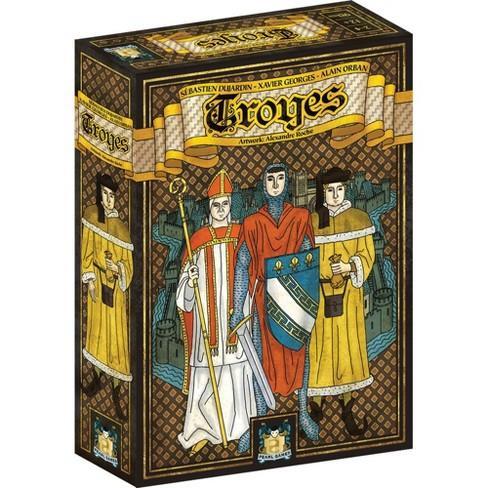Troyes Board Game Review
Overview:
Name of the game: Troyes
BGG Weight: 3.46 / 5
Year published: 2010
Publisher: Pearl Games
Designer: Sebastien Dujardin, Xavier Georges, Alain Orban
Number of players: 2-4
Playing time: 90-120 minutes
Game category/theme: Medieval, Dice Rolling, Strategy
Mechanics: Area Majority / Influence, Dice Rolling, End Game Bonuses, Events, Hidden Victory Points
Ratings:
Strategy: 9.2
Complexity: 7.5
Player Interaction: 8.7
Replayability: 9.0
Game Rating: 9.1
Cost: 6.0
Calculations:
Weight Rating = 7.5 + 9.2 = 16.7
Playability Rating = [(9.0 + 8.7 + 9.1) – 7.5] = 19.3
Play Rating Score = (16.7 + 19.3) x 2 = 72
Value Rating = 72/ 6.0 = 12
Final Score Rating = 72 + 12 = 84.00
Review:
Troyes is a challenging and engaging game set in medieval France. Players take on the roles of influential citizens of Troyes and must work together to build the city’s infrastructure, fend off invaders, and maintain the city’s prosperity. The game is played over several rounds, each representing a different era in the city’s history.
Players use dice to activate their workers and complete various actions, such as buying buildings, recruiting soldiers, and gaining victory points. The game also features unique variable player powers that allow players to specialize in different areas, such as military strength or civic affairs.
One of the game’s strengths is its high level of replayability, as the different combinations of buildings, events, and player powers ensure that each game is unique. The game also features a high level of player interaction, as players must balance their own goals with the needs of the city and the other players.
Troyes does not offer solo or cooperative play, as it is a competitive game designed for 2-4 players. It is a great choice for gamers who enjoy strategy games with deep gameplay and high replayability.
10 Games to Try if You Like Troyes:
- Orleans – a game about building a medieval trading network, with dice rolling and worker placement mechanics.
- Viticulture – a game about running a vineyard, with worker placement and card drafting mechanics.
- Concordia – a game about building a trade empire in ancient Rome, with card drafting and resource management mechanics.
- Brass: Birmingham – a game about building a manufacturing network in 19th century England, with worker placement and economic simulation mechanics.
- Gaia Project – a game about colonizing a new planet, with worker placement and resource management mechanics.
- Teotihuacan: City of Gods – a game about building and expanding the ancient city of Teotihuacan, with worker placement and resource management mechanics.
- Caylus – a game about building a medieval castle, with worker placement and resource management mechanics.
- Architects of the West Kingdom – a game about building a medieval cathedral, with worker placement and resource management mechanics.
- Great Western Trail – a game about herding cattle along the western frontier, with deck building and tile laying mechanics.
- Puerto Rico – a classic game about building a colonial city in the Caribbean, with resource management and role selection mechanics.
This review was provided by Open Source Artificial Intelligence programs. It uses a series of complex statement to have AI programs amalgomate their databases to produces information on board games. These reviews are completely unedited output from the AI bots.

